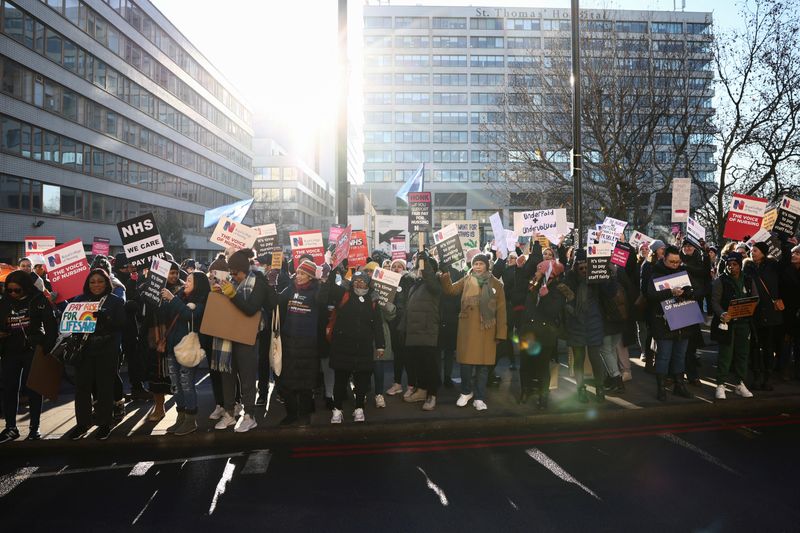
© Reuters. NHS nurses cast shadows as they strike, amid a dispute with the government over pay, outside St Thomas’ Hospital in London, Britain December 15, 2022. REUTERS/Henry Nicholls/Files
By Kylie MacLellan
LONDON (Reuters) -Britain’s nurses’ union issued an ultimatum to the government on Tuesday to respond to its pay demands or face further strike action in January as staff walked out for the second time in a week, piling pressure on ministers to act.
Ambulance staff in England and Wales are set to follow suit on Wednesday and Dec. 28, leaving those with all but the most life-threatening conditions to make their own way to hospital.
The industrial action by up to 100,000 nurses is unprecedented in the British nursing union’s 106-year history, but it says it has no choice as the soaring cost of living leaves workers struggling to make ends meet.
The Royal College of Nursing (RCN) union, which says its members’ real-term earnings have fallen by 6% in the last decade, has called for a pay rise of 5% above the RPI rate of inflation, which stood at 14% in November.
The government has offered nurses around 4% on average, on the recommendation of an independent pay review body, and has declined to discuss pay further. Prime Minister Rishi Sunak says the nurses’ demands are unaffordable.
“I will negotiate with him at any point to stop nursing staff and patients going into the new year facing such uncertainty,” RCN head Pat Cullen said.
“But if this government isn’t prepared to do the right thing, we’ll have no choice but to continue in January.”
The RCN gave the government 48 hours from the end of Tuesday’s strike to respond before it announces further dates.
“Our door is open to discuss with the unions anything relating to working conditions. What we can’t do is go back into reopening the pay award,” junior health minister Will Quince told Sky News.
MILITARY TO HELP OUT
The strikes are putting extra pressure on healthcare provision in the state-funded National Health Service when it is already stretched by staff shortages and record backlogs due to COVID delays.
“Our members are tired of going to work every day and in some cases, spending the whole of their shift sat on an ambulance outside an A&E department with the same patient,” Rachel Harrison, GMB union public services national secretary, told a committee of lawmakers on Tuesday.
“We’ve had examples where our members have clocked off at the end of one shift to return the following day to the same patient being on that ambulance.”
The military have been put on standby to help drive ambulances, although they will not have the powers regular emergency vehicle drivers do.
Ministers are meeting with unions on Tuesday to discuss which emergencies ambulances will still respond to, amid media reports those suffering heart attacks or strokes may be left to make their own way to hospital.
“I’ve been absolutely clear with the unions … that life threatening and emergency situations must be covered as part of minimum service level guarantees and we’ll be repeating that expectation later,” Quince told the BBC.
The government has said it is looking at introducing new anti-strike legislation next year which could include banning strike action in key sectors.
Source: Investing.com


























